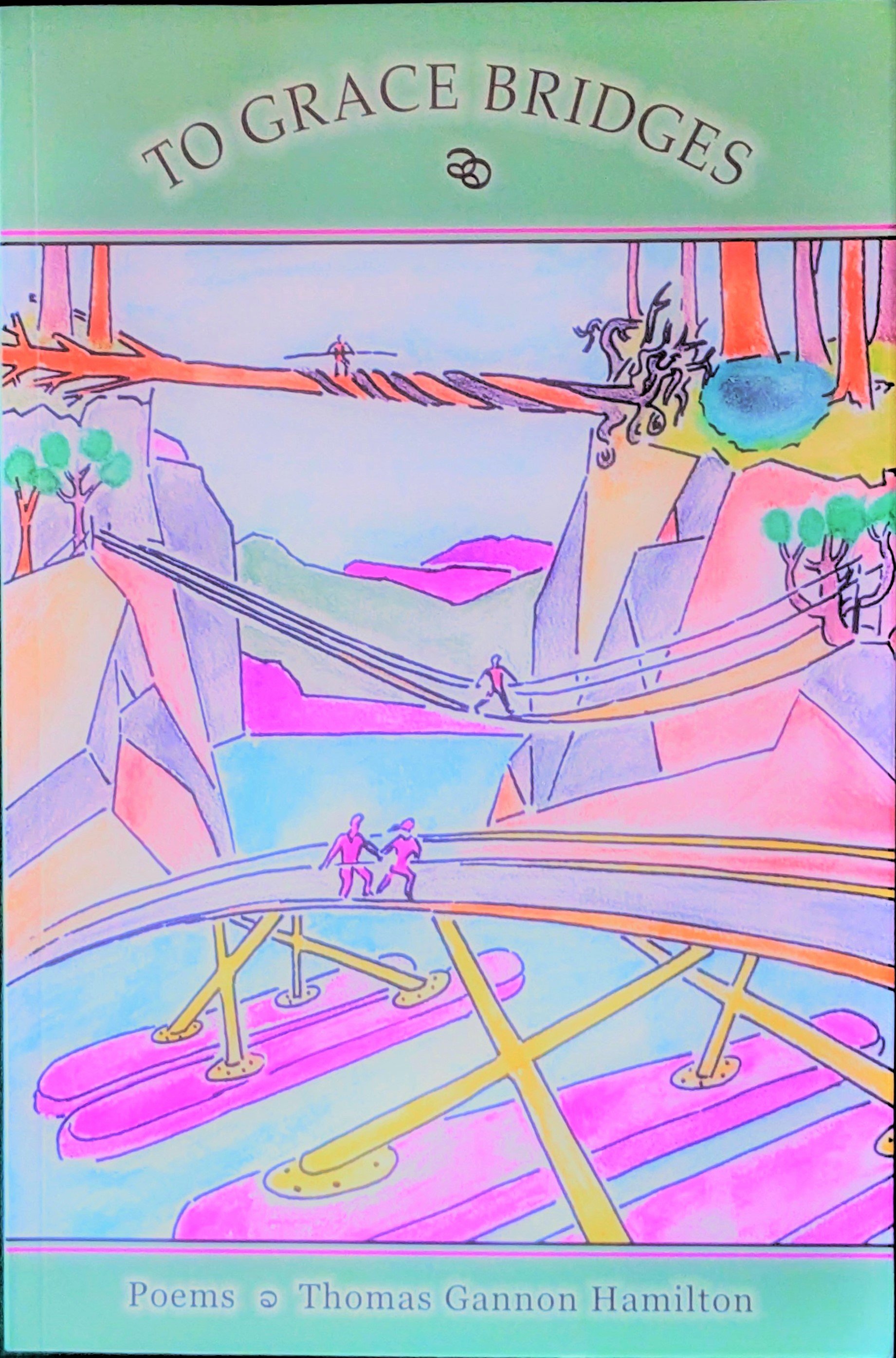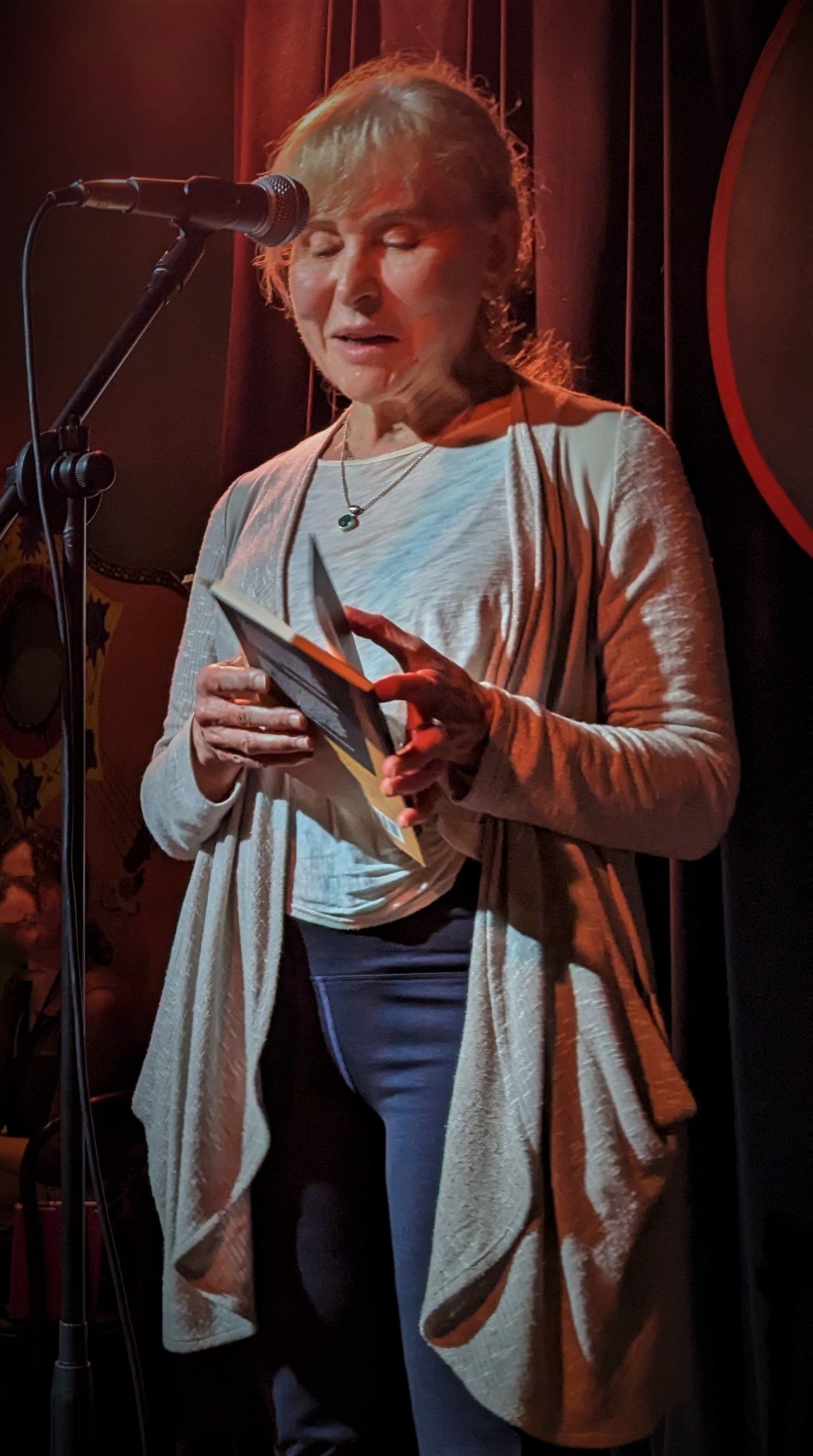A Quartet Of Aeolus House Poets Reviewed by Robin L. Harvey
To Grace Bridges by Thomas Gannon Hamilton
Learning to Leave by Ariane Blackman
The Many Faces by Felicity Sidnell Reid
Timed Radiance by Donna Langevin
Thomas Gannon Hamilton’s latest book, To Grace Bridges, is a collection to stir the heart and challenge the mind. “The art of the word is key to keeping humanity– the hearts of humans – sustainable,” he said in an interview at the book launch held this spring at Toronto’s Hirut Café.
“All artists must keep their eyes open . . . and know the aesthetics of language is essential to keeping communication alive and thriving.” Hamilton’s latest collection is indeed awash in passion, with muscular prose touched with a colloquialism that makes the work accessible and sustainable. Readers will findelements of “beauty, truth and love,” as promised in the foreword.
Thomas Gannon Hamilton— photo Robin L. Harvey
One of the book’s best poems is Sleep Cycling, a rhythmic and rousing first - person journey though dream imaginings across an urban nightscape. “My mind’s needle covers the grid, graphs in real time our city’s heavily trodden heart, monitors her congestive condition, by passes construction-obscured artery, clotted . . . until I am the sole traffic in the town,” Hamilton writes elegantly in the last stanza of part one of the poem.
The poem, Euclid, Pythagoras and Me, employs wit and intellect in a series of jocular musings on personal relationships and their patterns and shapes across a lifetime. “It’s been good working with Pythagoras; mood-valleys, yes, but such expressive peaks,” the poet writes, wrapping up with the conclusion that nonetheless “our scalene, isosceles and equilateral relations” share one plane. The aptly titled Flood reads as part epic/part and ballad.
The poem is pegged to a Biblical passage from Luke about the strength of faith where Hamilton links the prose lines to specific years that the Mississippi and Missouri Rivers overflowed to craft an analogy for the growth of charismatic Protestant dogma.
In Bi-Millennial each line begins numeric dates from the 21st Century, starting with the year 2000 in synchronic progression until 2022. The words in the lines that follow each date use whimsical word play to punctuate the author’s aphoristic commentary on the changing times.
Hamilton’s broad intellect and education draws on traditional poetic form to ground this contemporary work. But he is also an irreverent poet, full of surprises, who will take risks and embrace the new. The book is the third in a trilogy published through Aeolus House. Other Aeolus poets who read at the launch included Ariane Blackman, Felicity Sidnell Reid, and Donna Langevin.
Blackman read from Learning to Leave, a book she dedicated to her parents— both members of the Polish resistance and Holocaust survivors. The book reflects, with honest clarity and measured tenderness, how such family origins affect future generations. In Home “a place I thought I could leave,” she uses a mix of observational and conversational lines to relay traumatic content.
“I’ve thought about it and tried to understand what war-torn country means, what murdered family means, why every dirty secret and every dirty lie becomes the truth it never was. My mother fled that country, my father died.”
Ariane Blackman photo courtesy Robin L. Harvey
Other poems like the more abstract Sea Creature, charm with dream-like imagery. “… the dense stalks I hide in remake me a creature of night and light from where I reach and outreach . . . taking the hook that baits what I desire— a lure of dark towards bright.”
In Scent the poet’s crisp language evokes a sharp sense of existential isolation. “This fertile scent of melon – filling space in mouth-ripe circles with every step we took into the room that Black Sea Georgian summer.” Blackman’s favourite poem is the title work, Learning to Leave - a story of courage, the courage to face new beginnings, in a life that has endured much loss.
“My mother held up her hands . . . like the city of rubble she left, the world had become too big to swallow. Her index finger never wavered.”
Sidnell read from The Many Faces, a collection of direct narratives, punctuated with imagery that compels the readers’ focus. A good example is The Long Embrace, a sweet, delicate childhood memory of Christmas in a home air raid shelter during the Second World War. The poem’s words rush fast with fear as the doorbell rings, then ease for a welcome relief of tension to rejoice in the unexpected visitor - a father who gives his girls a puppy before he inhales the fleeting safety, holding his wife a long embrace.
The Broken Bubble well expresses the careful containment mothers use to hold children fast and safe - until the world breaks through, as in the assassination of JFK. “Assassination turned obsession; the parade, the car turned bloody chariot, the fallen body, an image incised upon the memories of millions.”
Langevin read from Timed Radiance, a powerfully written brave collection that tackles taboos of age, death, and violence. The book also relates contemporary events, some from the recent pandemic.
The gripping poem Gratitude reflects on a real-world event during the pandemic where a cement mixer killed a Toronto woman. “… death is a shape shifter that might come with a stroke, slip of a scalpel, heart that forgets its rhythm or a fall in the bathtub … I do not say… past the bloodstains on the road, that gratitude smells like the cement mixer I didn’t get hit by today.”
The author often balances dark content with humour, well expressed in the poem, To the Anti-Vaxxers (after Dr. Seuss) — creating a parody of magical thinking using the children’s author’s simple beat, rhyme and rhythm. Aeolus House publisher Allan Briesmaster has winnowed back his slate of authors over the years.
However, he says as a publisher he tries to fill, “a gap in the poetry landscape by producing books of excellent literary quality that might otherwise be overlooked by more mainstream publishers who are constrained by the grant system and by current cultural trends.” Briesmaster expressed concern over how fragmented poetry’s readership has become.
“Poetry ought to be able to be enjoyed by everyone, not just other poets. I resist the idea that being difficult to understand is an indicator of superior merit.”
To Grace Bridges by Thomas Gannon Hamilton, 131 pages, Aeolus House $20
Learning to Leave by Ariane Blackman, 88 pages, Aeolus House, $20
The Many Faces by Felicity Sidnell Reid, 94 pages, Aeolus House $20
Timed Radiance by Donna Langevin, 50 pages, Aeolus House $20




